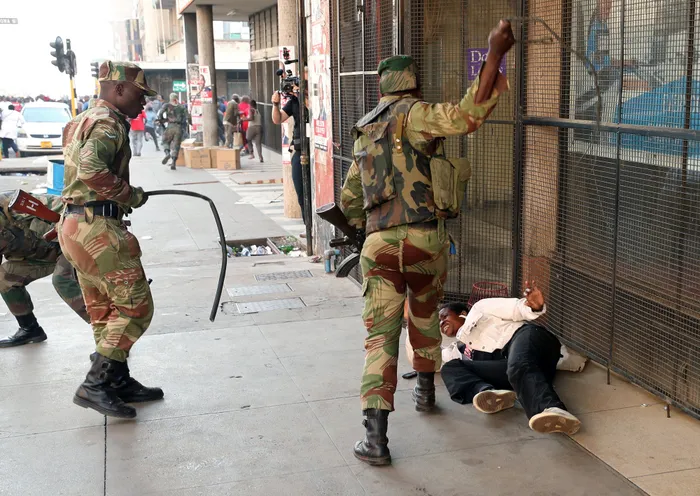Civil liberties regress in Africa

Picture: Mike Hutchings/REUTERS/Files – Soldiers beat a supporter of the opposition MDC party of Nelson Chamisa, who has since become leader of the Citizens Coalition for Change, outside the party's headquarters as they await the results of the general elections in Harare. Zimbabwe typifies the deterioration of human rights on the Continent, the writer says.
By Mxolisi Ncube
As South Africa marks Human Rights Day this week, March 21, Zimbabwe best typifies the abuse and flouting of the 1948 United Nations Declaration of Human Rights.
The next general elections in Zimbabwe are due by August 31 this year.
Under the belly of sloganeering, posturing and countless interviews by politicians as they run for various levels of public office, ordinary citizens share probably one prayer – the divine plea for peace and respect for their human rights.
Human rights violations in Africa, in general, and Zimbabwe, in particular, have been exacerbated by outside interference by Western nations and corporations exploiting their mineral resources. It is not a prayer formed in a vacuum: a Zimbabwe edging closer to any form of election is a country far divorced from normalcy.
Pre-election period is loathed in Zimbabwe, mainly due to the toxicity of her politics. Political violence has accompanied nearly every election time in Southern Africa since 1980.
The date of this year’s plebiscite is yet to be announced, but the tell-tale signs of a country most likely to slide back to the abyss of violence and human rights violations are already showing.
Last year, opposition legislature Godfrey Sithole spent more than five months in prison without trial, accused of inciting violence. Another opposition leader, Job Sikhala, has languished in Harare’s Chikurubi maximum security prison for more than nine months.
Both are members of the Citizens Coalition for Change (CCC), whose leader, Nelson Chamisa, is President Emmerson Mnangagwa’s main rival for this year’s election, likely to be a repeat of the 2018 polls.
Nine members of the secessionist Mthwakazi Republic Party (MRP), which agitates for the separation of the western region of Matabeleland from the rest of the country, are also languishing in prison. Charged with public violence, they were jailed for 33 and 36 months in June last year for demonstrating outside a police station in the country’s second-largest city of Bulawayo.
Zimbabwe is a politically polarised country, but opposition parties and human rights groups have accused President Mnangagwa and Zanu-PF of using state apparatus to suppress dissent, block opposition campaigns and unleash violence on both the opposition and citizens ahead of every election.
During the days of fallen dictator Robert Mugabe, Mnangagwa was seen as the face of Zanu-PF’s political violence. Still, upon assuming power in a coup which toppled his former master in 2017, he promised his “Second Republic” would do things differently and usher in political peace and economic progress. That promise is yet to be fulfilled.
In November last year, the United Kingdom government and legislatures joined Zimbabwean civil society in raising concerns over increased human rights violations and political violence in the country.
Clashes between the governing Zanu-PF and CCC, which broke out during last year’s by-elections, seem to have been the precursor to worse scenes during the coming few months.
According to a 2007-2022 human rights and the rule of law indicator by Global Economy report, Zimbabwe ranks among the top 30 countries with the worst human rights record in the world.
The Human rights and the rule of law indicator consider the relationship between the state and its population concerning protecting, observing and respecting fundamental human rights and freedoms. In a rate of 1-8, in which the higher the indicator’s value, the less protected the human rights and the rule of law in the country, Zimbabwe rates 8.78 during that period, with a minimum of 8 index points in 2021 and a maximum of 9.9 index points in 2009. The latest value from 2022 is 8.1 index points, in a 2022 world average which stood at 5.37 index points for 177 countries.
A 2021 report by international human rights watchdog Amnesty International, also rated Zimbabwe lowly in terms of respecting human rights, even during President Mnangagwa’s reign.
“The human rights situation continued to deteriorate, with the government demonstrating hostility to human rights defenders, protesters, political activists and journalists,” reads the Amnesty International report partly, highlighting that dissenting voices were harassed, arrested, prosecuted and subjected to prolonged pretrial detention, with one activist killed allegedly by supporters of the ruling party.
“The state weaponised Covid-19 lockdowns to restrict political activity. Security forces carried out unlawful killings. The Supreme Court quashed a 20-year prison sentence against two opposition supporters. Thousands were forcibly evicted from their land. Public hospitals remained underfunded, and poor healthcare infrastructure put women’s and girls’ health at risk. Many people were at risk of becoming stateless.”
Disrespect for freedom of expression bemoans arbitrary arrests and detentions, denial of freedom of association and unlawful killings are captured in the report, which adds that Zimbabweans are also being denied the right to a fair trial, right to housing, suitable to health, women’s and girls’ rights and right to a nationality.
“Thousands were made homeless due to the authorities’ demolitions of homes built on what the government termed “illegal settlements”.
“In rural areas, many communities were threatened with forced eviction or evicted for resisting “economic investment” initiatives. For example, thousands of villagers were driven off their land in Chisumbanje in Manicaland province and their crops destroyed to make way for a fuel company to expand its sugar cane plantation,” adds the report.
Human rights must begin with ensuring that the wrongs are rectified – starting in Zimbabwe.
Mxolisi Ncube is an experienced writer and award-winning journalist with a demonstrable history of working in the newspapers industry